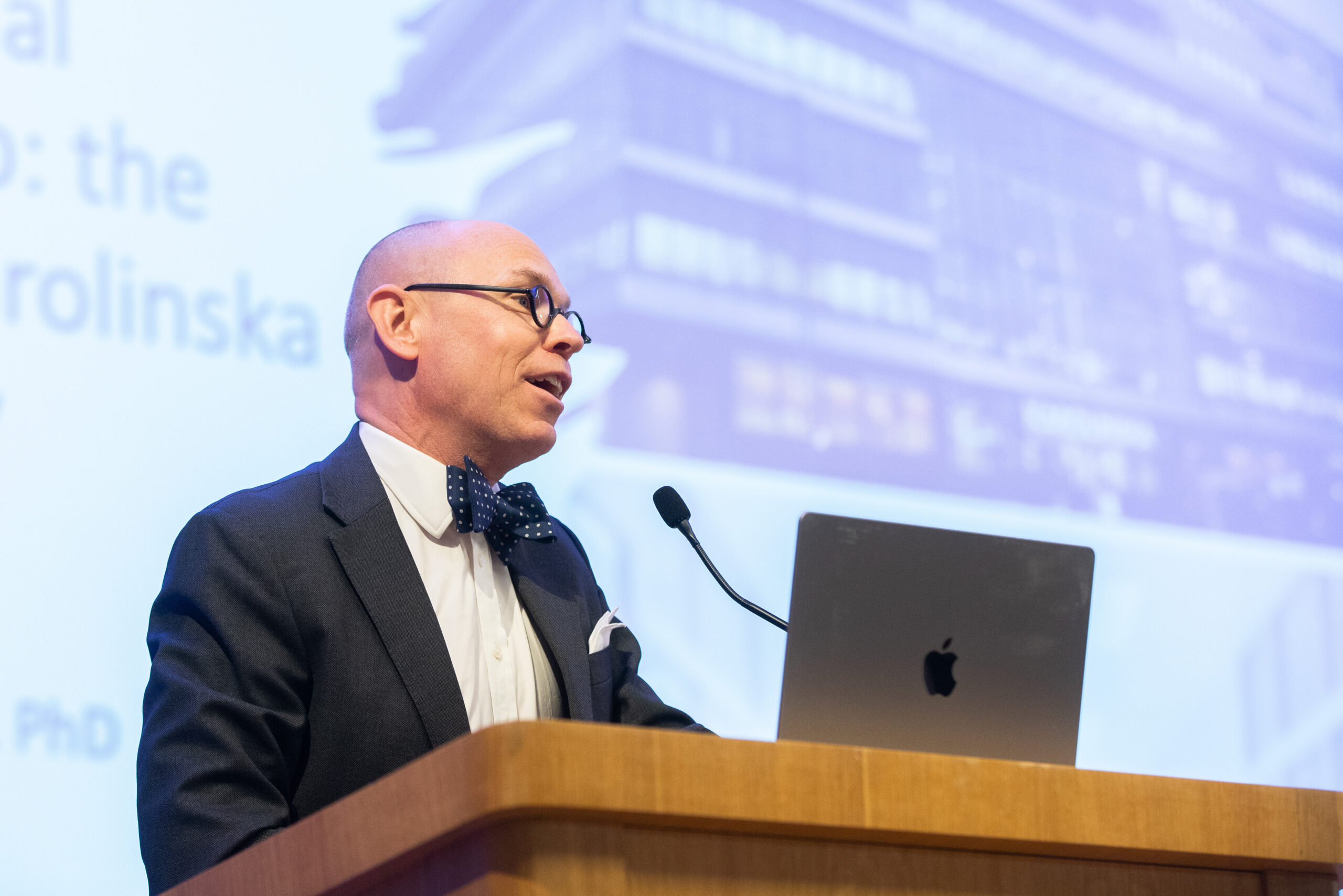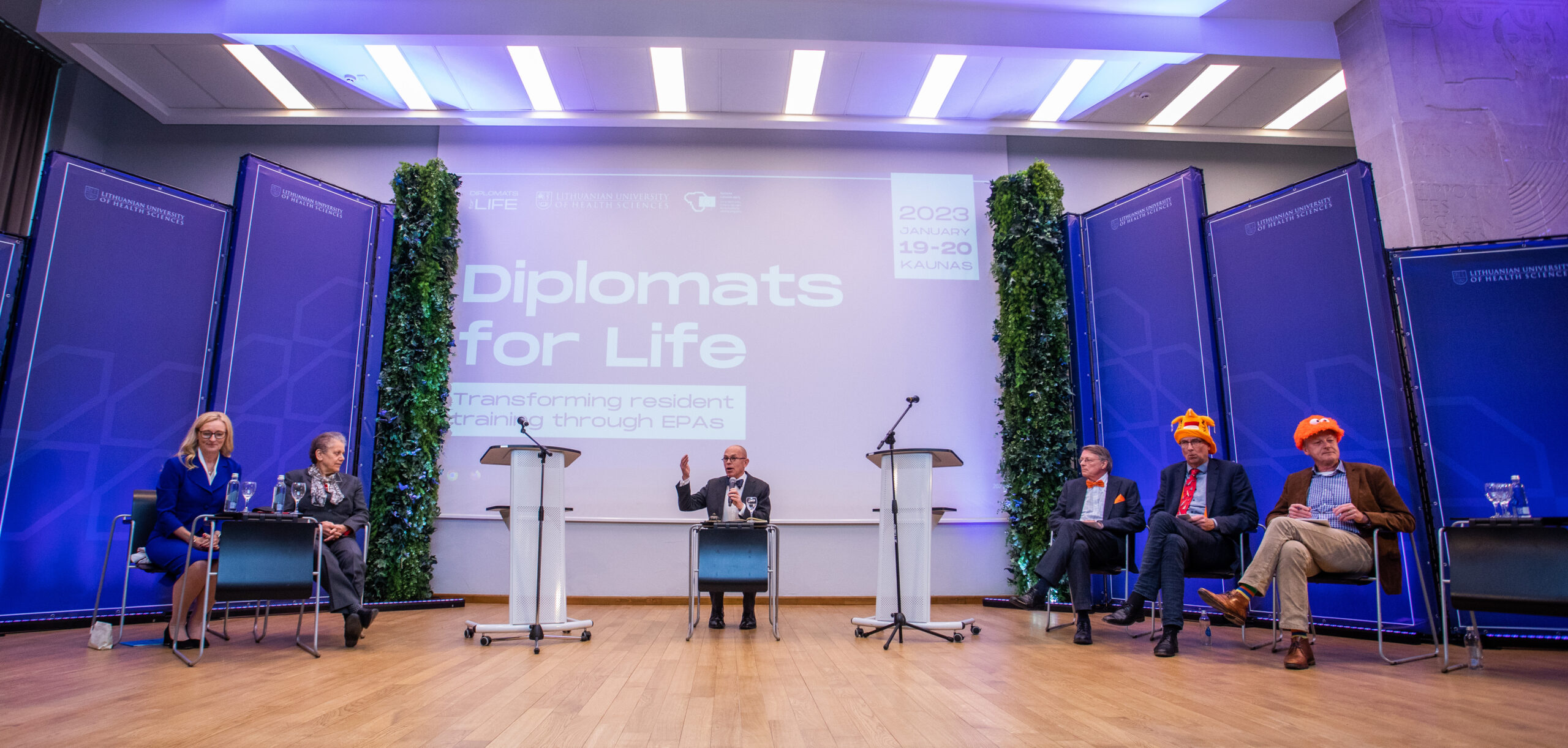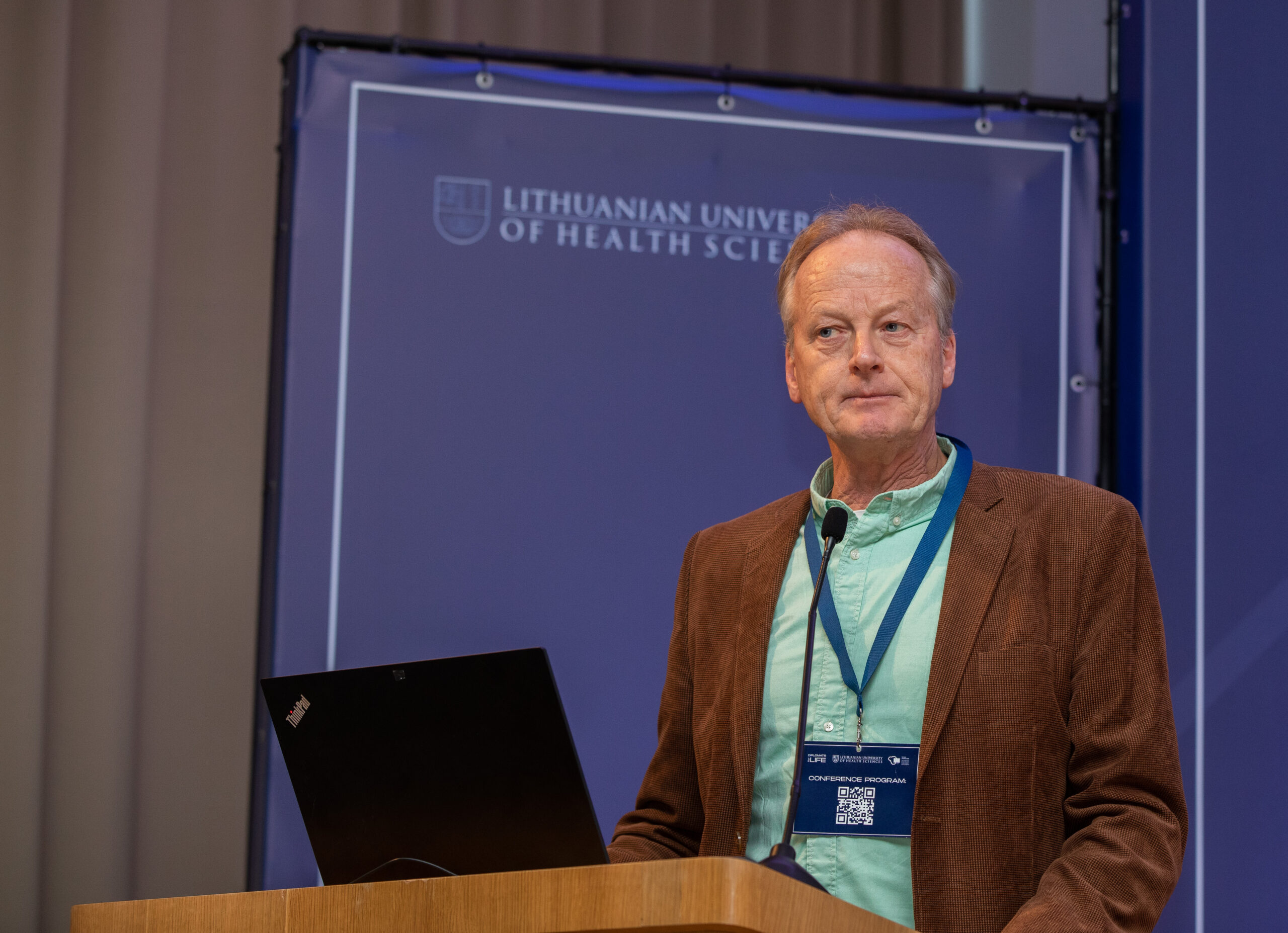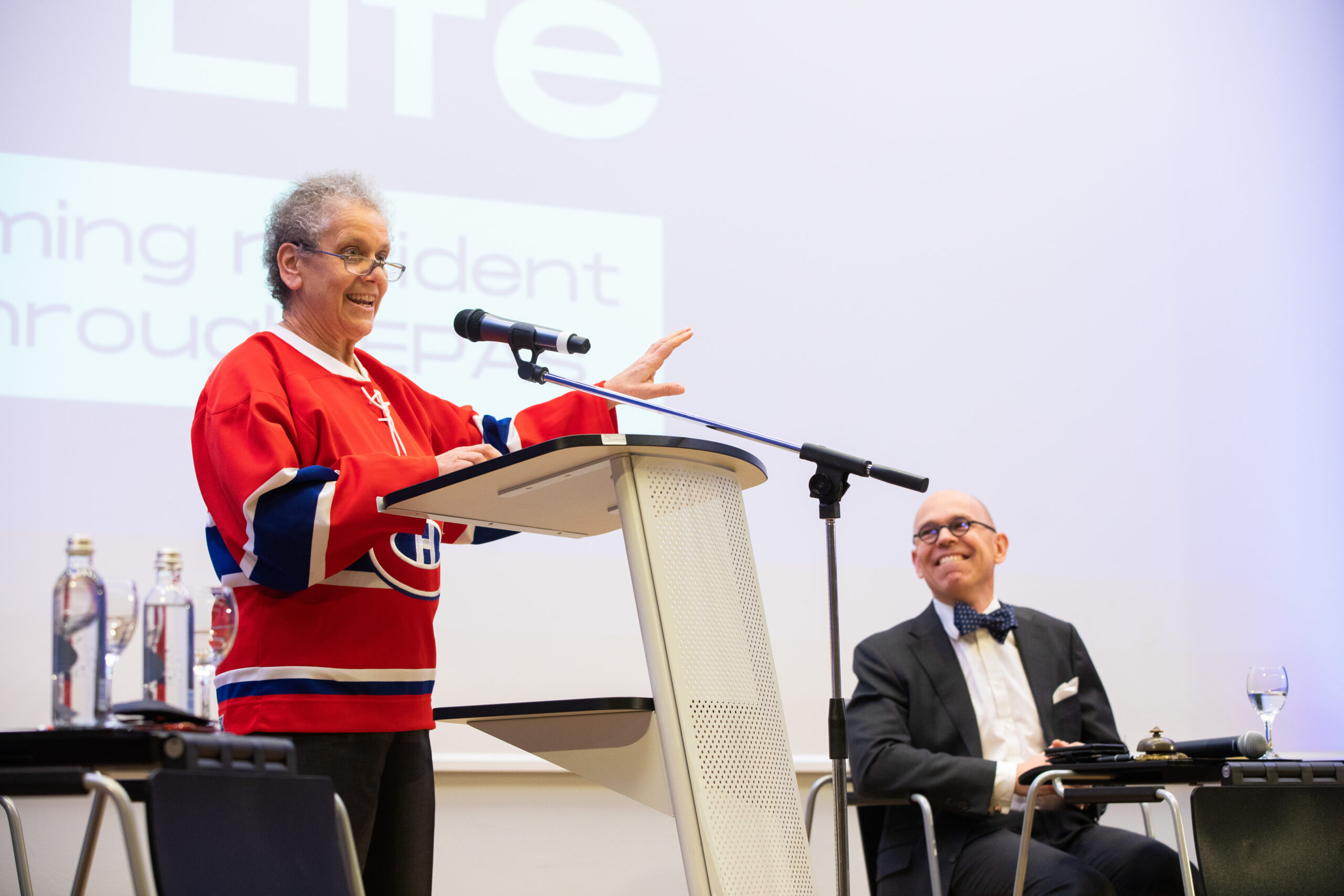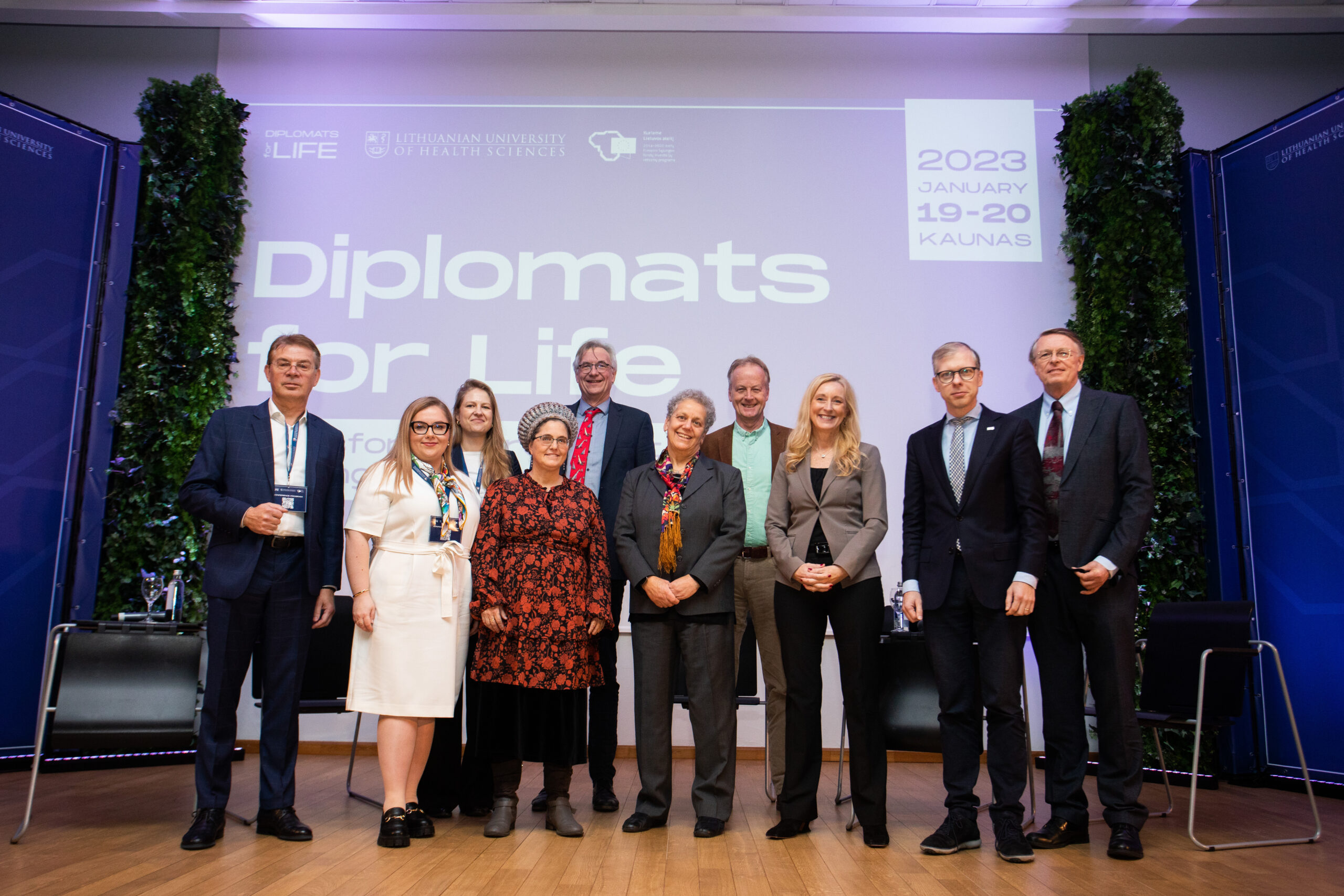LSMU Brings Together Global Leaders in Education: the Focus on EPAs
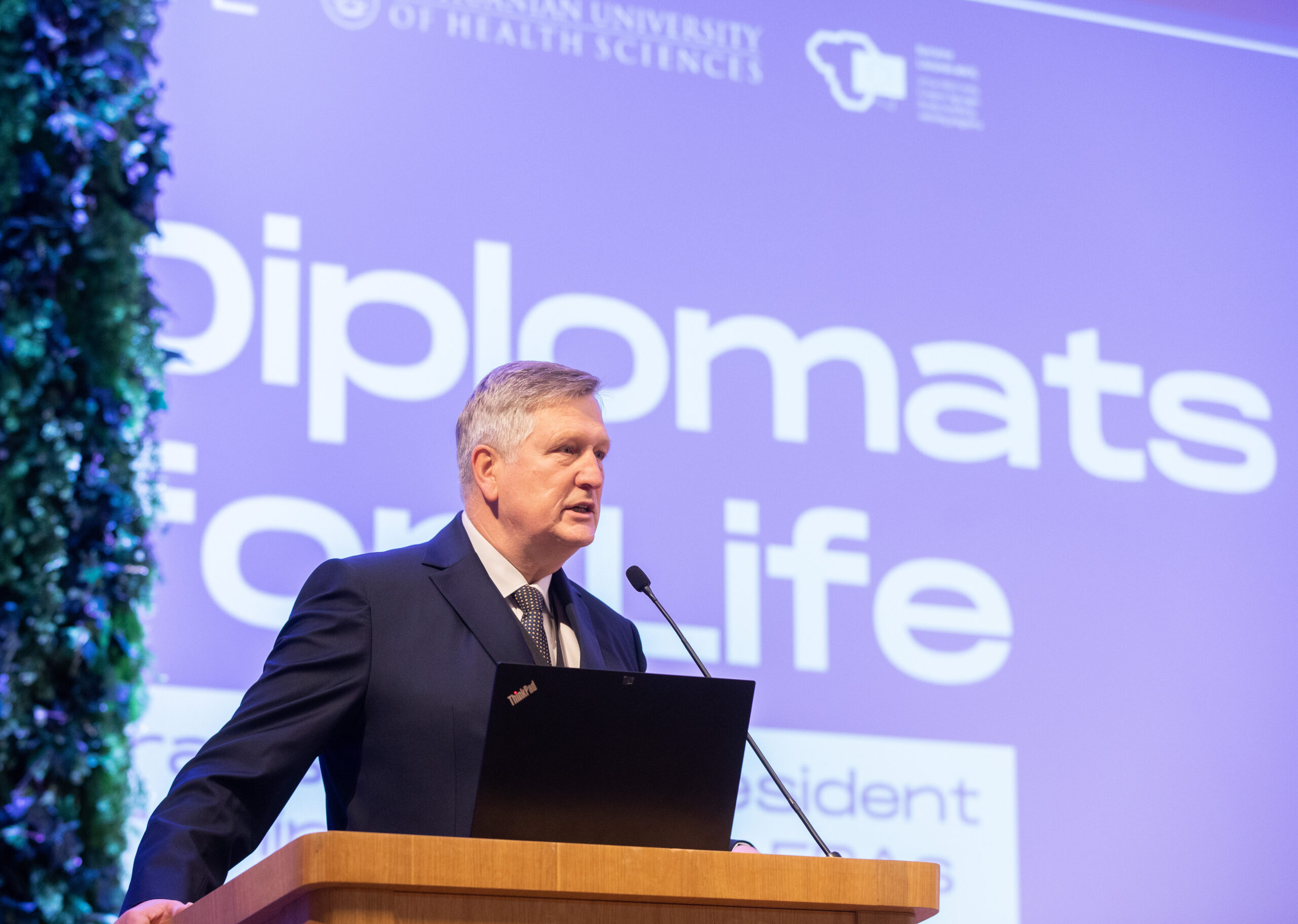
Last week, world-renowned key opinion leaders in medical education gathered at the Lithuanian University of Health Sciences (LSMU) for the traditional university conference Diplomats for Life. This year’s event is special as it coincides with the launch of the long-awaited EPA model in Lithuania. This was the focus of the two days of discussions, during which the LSMU drew on the expert experience.
Learning from the Best
This year, Lithuania is launching the EPA (Entrustable Professional Activities) model. This is a long-awaited breakthrough in the medical residency system, which took several years to prepare for. Although the topic of EPA was discussed at previous Diplomats for Life conferences organised by the LSMU, this year the topic was at the top of the agenda.
Sharing the latest impressions of the event, Prof. Juozas Kupčinskas, the Head of the Organising Committee of the conference and the Dean of the Centre for Postgraduate Studies, was pleased to note that the LSMU had the chance to welcome global leaders in medical education from the Karolinska Institutet (Sweden), McGill, Toronto (Canada), Groningen, Vrije, Utrecht (the Netherlands), and the Ben Gurion (Israel) University Centres. “These are the people who lead the world’s leading medical education organisations and shape medical education policy internationally,” emphasised Prof. J. Kupčinskas. Prof. Linda Snell, Prof. Adelle Atkinson, Prof. Fedde Scheele, Prof. Jonas Nordquist, Prof. Olle Cate and others are world-renowned experts in medical education who have implemented the EPA models in their countries.
Development of an EPA model for medical residency studies in Lithuania involved a comprehensive analysis of the models applied in Western countries. “Although similar in substance, they are adapted to each country’s legal system and historically developed circumstances of medical practice. We looked at the EPA systems in Canada, the U.S., and the Netherlands, as these countries have made the most progress. The examples that were most suitable for our system became the framework and the basis for the LSMU model,” said the professor.
In Lithuania, the LSMU has collaborated with representatives of different specialties and Vilnius University, as the list of EPAs for each specialty is common to all universities. Prof. J. Kupčinskas is cautious about celebrating too early, as the work is still in progress, and the implementation of the EPA model will require considerable effort. “There are certain legal aspects that still have to be resolved, the servicing of the e-portfolio, involvement of the faculty and future colleagues, and other aspects of organisation and implementation will have to be addressed,” the Dean listed the challenges ahead.
Therefore, the presentations and seminars during the conference focused on the major aspects of the implementation of the EPA model. Foreign experts talked about the challenges they had faced in the implementation of the EPAs in their countries and the most challenging aspects in their cases.
The guests also praised the progress that Lithuania has made with the EPA model, noting that Lithuania was even ahead of some Western countries, as the EPA model has been fully implemented in the Netherlands and a few other Western European countries.
Prof. Habil. Dr. Renaldas Jurkevičius, Vice-Rector for Clinical Medicine at LSMU and Director General of Kaunas Clinics is particularly pleased with the changes:
“We are excited about the major changes in the implementation of the residency, such as the extended duration of residency studies, all residency study programmes updated, and the concept of EPA to be launched in the new academic year. This will ensure an even better quality of studies, greater responsibility and involvement of the residents in their studies and in the treatment of patients. This is rather a tremendous leap than just a step forward, and we look forward to its successful implementation. The International educational conference is a good opportunity to verify that we are on the right track”, said Prof. R. Jurkevičius.
Three Years before We See the Result
The EPA will be applied in all 57 medical residency and 7 odontology study programmes at LSMU. Prof. Juozas Kupčinskas, Dean of the Centre for Postgraduate Studies, told the conference participants about the road towards EPAs in Lithuania: what’s behind and what’s upfront. “So far, the residency study programme has consisted of competences, cycles, skills, procedures, and exam descriptions. Starting this year, it starts to include EPAs, competency areas, sub-competencies, an e-portfolio, new assessment tools, quality assurance tools,” said the Dean about the changes in resident training. Resident doctors will be able to immediately apply the EPAs on their own, working at the residency facility and learning other skills. To obtain a certificate of new competence for EPAs, they will have to fulfil the requirements for acquiring the competency.
How long will it take to see the results of the EPAs? “This is a rather important question because we might have programmes on paper, but we are yet to see their implementation results in reality,” pointed out Prof. Kupčinskas. – I believe there are two to three years before we see a certain result. The residents and their supervisors will have to adapt to the new system, and as they work with it, the effective parts of the model and the elements to be improved will gradually become clear”.
However, the Dean hopes that the first tangible results will appear in about two years’ time. “We have to be prepared that next year will be difficult as we will start it with new assessment procedures, and new study descriptions. We will try to ensure that the process runs smoothly, and if something is not working, we will address it. We will need the engagement of the entire university community, which is involved in this change,” Prof. J. Kupčinskas said.
E-portfolio is another novelty intrinsic to the EPA system, as the entire system of competencies for the EPAs will be registered in the virtual environment. “There are pools of information to be processed and all the data has to be structured in a way that makes it easy for the residents themselves and their supervisors to carry out the assessments. We have planned a lot of different functions – we have spent a lot of time developing the functionalities of the e-portfolio, we are testing them, and we hope that they will work well”, said the Dean.
Some voices would occasionally argue that Lithuania was late in introducing the EPAs, but Prof. Kupčinskas pointed out that it would be rather difficult to imagine the scale of the preparatory work for those not involved in it. “Since 2017, we have been working to make sure that the necessary legislation is in place, without which the EPA model would have been infeasible. Once the basic legal framework was in place in 2020, the next big and responsible task was to review all the study programmes,” said Prof. Kupčinskas.
“The introduction of EPAs is a long process irrespective of the country, and we are far from being outsiders here. On the contrary, experts from Western countries have stressed that the introduction of EPAs in Lithuania is going fast enough – the more so as this model has not yet been implemented in many Western European countries,” Kupčinskas concluded.
LSMU is very grateful to the Ministry of Education, Science and Sport of the Republic of Lithuania, which has provided funding from the EU Structural Funds for the implementation of this model. “We would also like to acknowledge our close cooperation with the Ministry of Health of the Republic of Lithuania, which actively facilitates in various issues related to this model.” J. Kupčinskas.
Strategy for Innovative Education is Ready
The conference Diplomats for life was opened by Prof. Kęstutis Petrikonis, Vice-Rector for Studies of LSMU, who welcomed the high-profile event and congratulated the distinguished guests. The Vice-Rector noted that the educational competencies of lecturers are crucial in the education of young doctors. Advanced medical knowledge is based on the highest standards of medical science, and the goals and actions of the lecturers should be guided by the latest research in medical education.
“Future research could focus on complementary teaching practices in medical studies, focusing on the pedagogical competencies of clinical lecturers,” says the Vice-Rector for Studies, adding that a research group on medical education has already been established at LSMU. According to the Vice-Rector, medical education requires Europe-wide guidelines, a national framework and intersectoral, interdisciplinary cooperation for it to be implemented comprehensively.
“A strategy for innovative education is ready. The most recent pedagogical development programme is a key prerequisite for the empowerment of lecturers and for future-oriented studies in the health care professions,” says Prof. K. Petrikonis, adding that the curriculum needs to be complemented in view of the national guidelines.
How can changes be implemented in the health sector? “People change if they care. Changes spread in parallel. We need clear and feasible changes in our behaviour. And it is also important to notice the small victories that matter,” the Vice-Rector shared his views.
Speaking about the introduction of EPAs in Lithuania starting this year, Prof. K. Petrikonis pointed out that the improvement of assessment criteria is critical in competency-based medical education. “A holistic approach to competency should also be emphasised. EPAs improve student assessment and are highly valued in the workplace,” said Prof. K. Petrikonis.
These important changes are expected to contribute significantly to the improvement of the quality of medical residency studies in the future.
Article published in the weekly “Lietuvos sveikata”
Sima Kazarian

